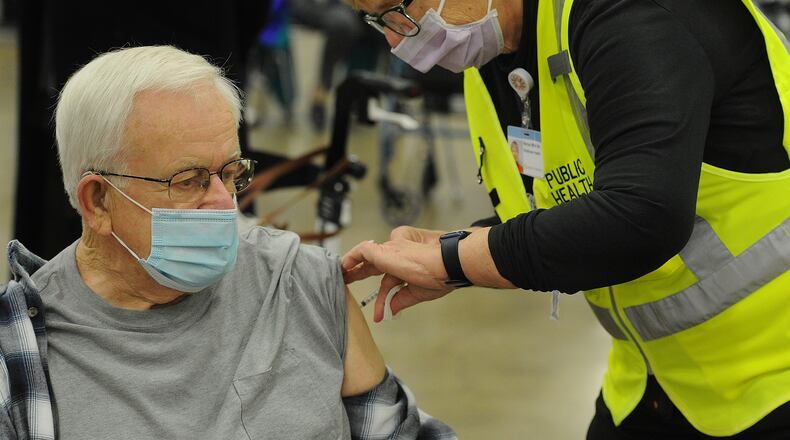The twin votes Friday represented a blow to the Biden administration’s sweeping effort to shore up nearly all Americans’ protection amid the spread of the highly contagious Delta variant. Previously, President Joe Biden promised that that booster shots would be available for adults as early as Monday, Sept. 20, an announcement some public health experts said at the time was premature.
Even after the panel’s decision, before booster shots can be rolled out to the public, there are a few more steps. The FDA is not obliged to follow the committee’s recommendation but it usually does. The agency will likely make a decision early next week. After that, the Centers for Disease Control and Prevention’s Advisory Committee on Immunization Practices will need to make a recommendation. That group is scheduled to meet next Wednesday.
Separate FDA and CDC decisions will be needed in order for people who received the Moderna or J&J shots to get boosters.
Approximately 1.6 million Ohioans over the age of 65 have gotten two doses of the coronavirus vaccine, according to the Ohio Department of Health, but it is unclear how many of them received Pfizer, the shot administered to over half of vaccinated Americans and most of Ohio’s nursing home residents. There are approximately 700,000 health care workers in Ohio.
In recent weeks, Ohio vaccine providers have been in limbo waiting for the final verdict on booster shots and unable to make definitive plans but preparing for a surge in vaccinations not seen since early this year. Local health leaders say they are ready, there’s no supply issue this time around and they learned a lot over the months of this vaccine roll-out.
“We have been working on distribution plans with partners to ensure that boosters will be available as needed, depending on possible federal guidance on booster timing and eligibility,” Ohio Department of Health Spokeswoman Alicia Shoults said. “However, until the federal government makes final recommendations on who is eligible and when, these plans cannot yet be finalized. Federal partners have assured us that the vaccine supply will be sufficient to support any approved booster program.”
Lisa Henderson, vice president of health initiatives at the Greater Dayton Area Hospital Association, said local vaccine providers have met weekly since December and lately have been discussing plans for boosters.
“Each of our hospitals and vaccine coordinators have been looking at really kind of what that data means even on a weekly basis. So they’re doing a look back to how many vaccines were provided in those first weeks, as the age band moved younger and there were more individuals eligible. They are really proactively planning for what those numbers could potentially look like even on a weekly basis,” she said.
Since demand for shots has fallen in recent months, health departments and hospitals have closed vaccine clinics or cut clinic hours. But local health leaders say they’re prepared to expand locations and hours as demand calls for it. Most Dayton-area vaccine providers got both Pfizer and Moderna, Henderson said.
Residents and staff at long-term care facilities — nursing homes, assisted living facilities, state psychiatric hospitals, group homes for individuals with intellectual and developmental disabilities, and Ohio veterans homes — almost exclusively received Pfizer vaccines during the first few months, so many of them will be eligible for boosters soon.
Peter Van Runkle, executive director of the Ohio Health Care Association, a trade association representing long-term care providers in Ohio, said their providers are preparing as much as they can for boosters.
“For example, the Ohio Department of Aging has asked all of the facilities, the assisted livings and the skilled facilities to go on to their website called COVID care. And they want them to kind of confirm their profile and their preferences for how they would want to receive vaccines. And they’re doing that in preparation for expanding the existing vaccine maintenance program where they’re capturing new people who come along to include the booster,” he said.
In January and February, Walgreens and CVS staff held vaccine clinics at Ohio’s long-term care facilities, but that arrangement is not happening this time around. Facilities will need to figure out how to staff their own clinics, possibly spread over more days, or partner with outside entities like the local health department, Van Runkle said.
The Associated Press contributed to this report.
About the Author

